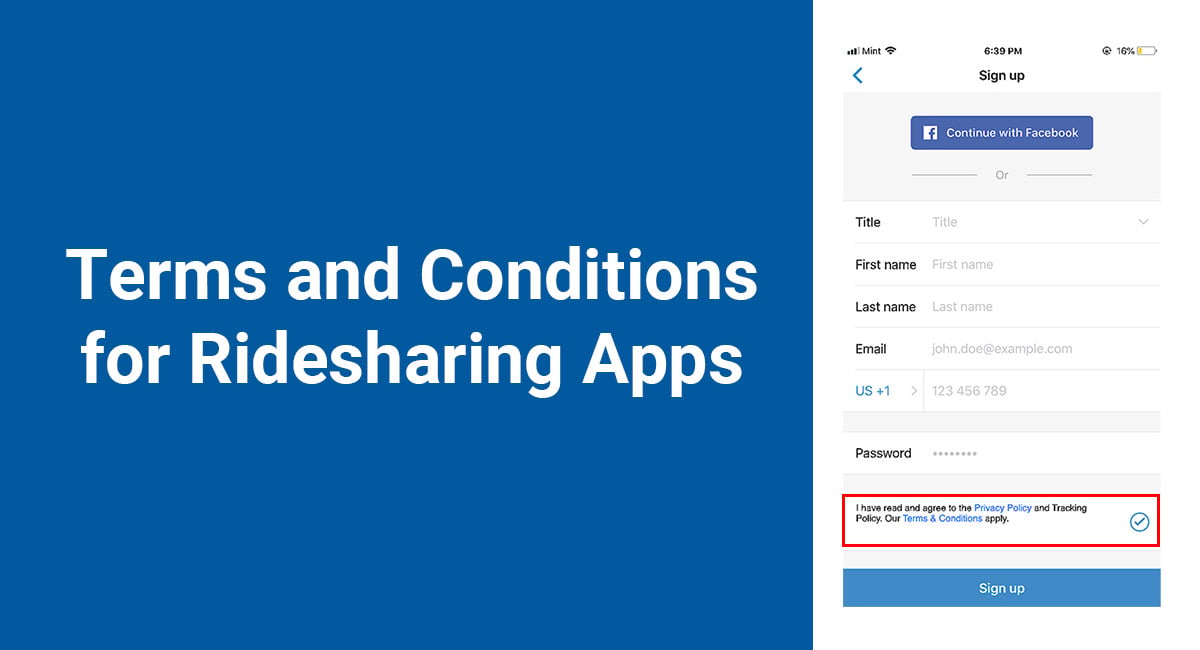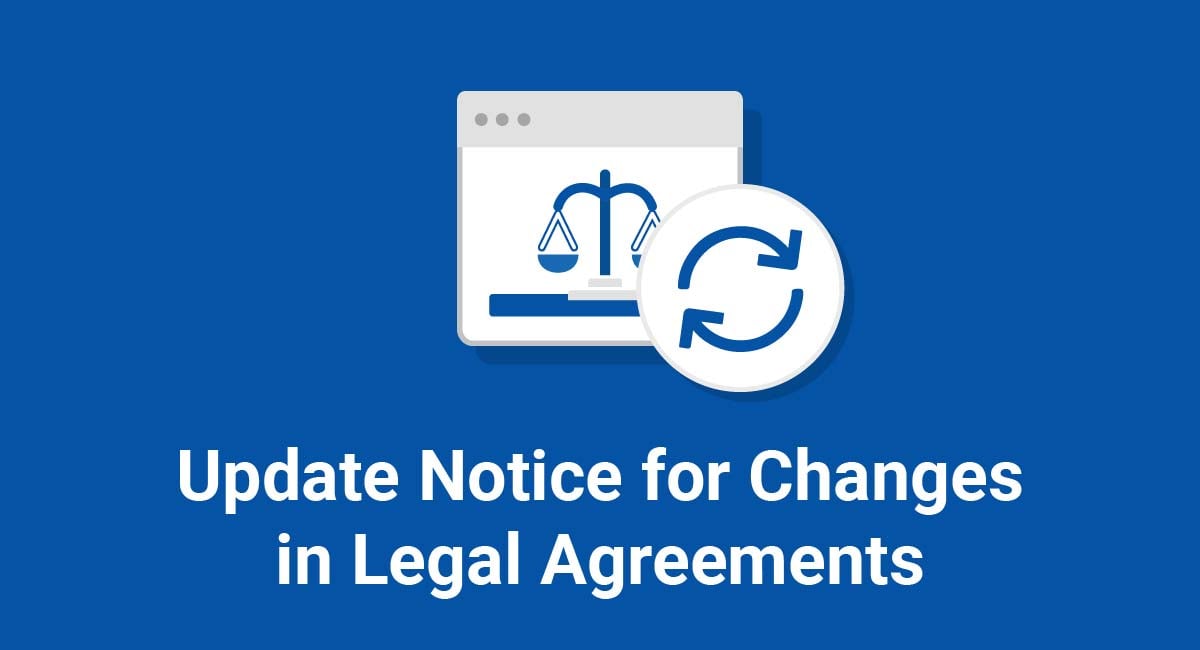Ridesharing apps are transforming the need for a personal automobile, especially in more urban areas.
In fact, some people aren't buying cars because they're able to rely on ridesharing. In London, 37% of users of car share companies chose not to buy a car at all and 17% of users intended to sell their personal car because the app satisfies their transportation needs. In other words, ridesharing apps are valuable not just to investors but to consumers who are beginning to rely on them for their total transportation needs (when they're not walking, taking the bus, cycling, etc.).
As the number of people who use ridesharing apps grows, it's important to protect your app and business with a strong Terms and Conditions agreement.
Our Terms and Conditions Generator makes it easy to create a Terms and Conditions agreement for your business. Just follow these steps:
-
At Step 1, select the Website option or the App option or both.
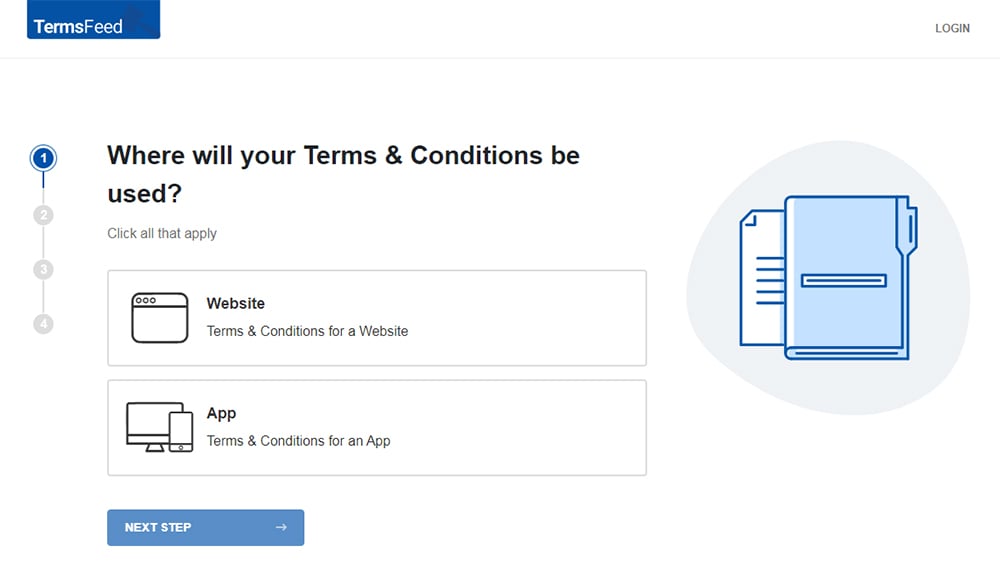
-
Answer some questions about your website or app.
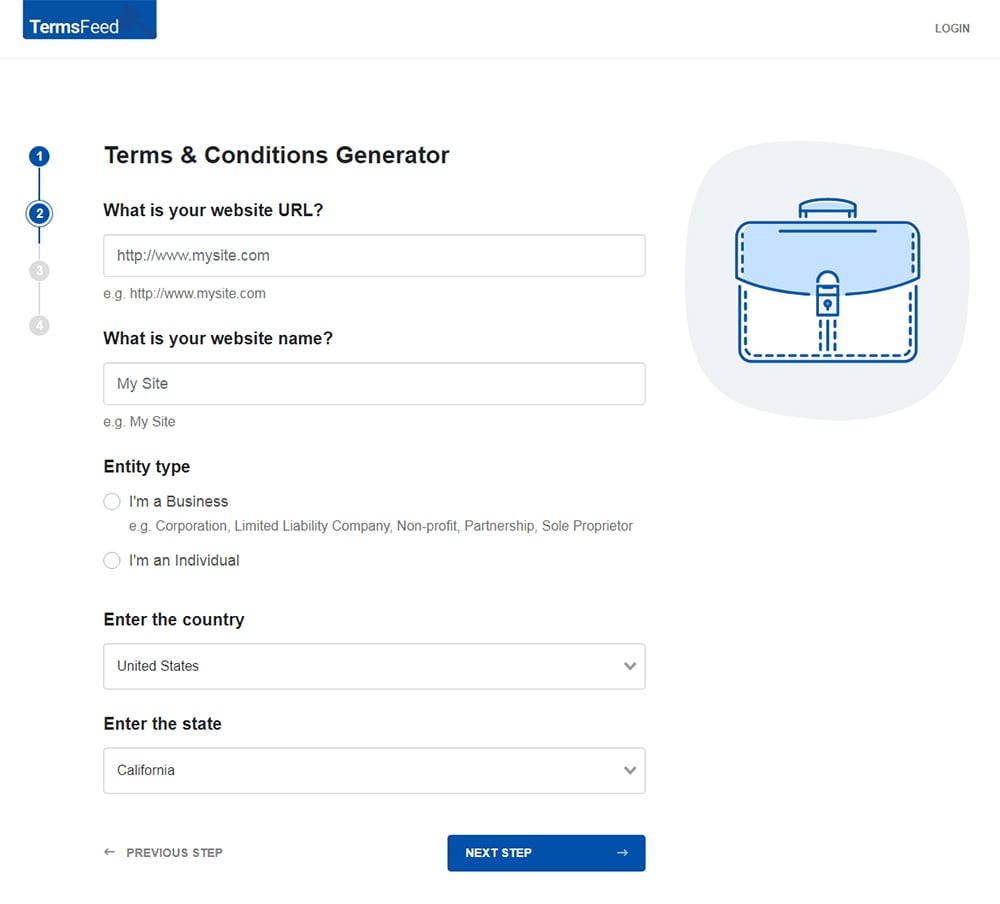
-
Answer some questions about your business.
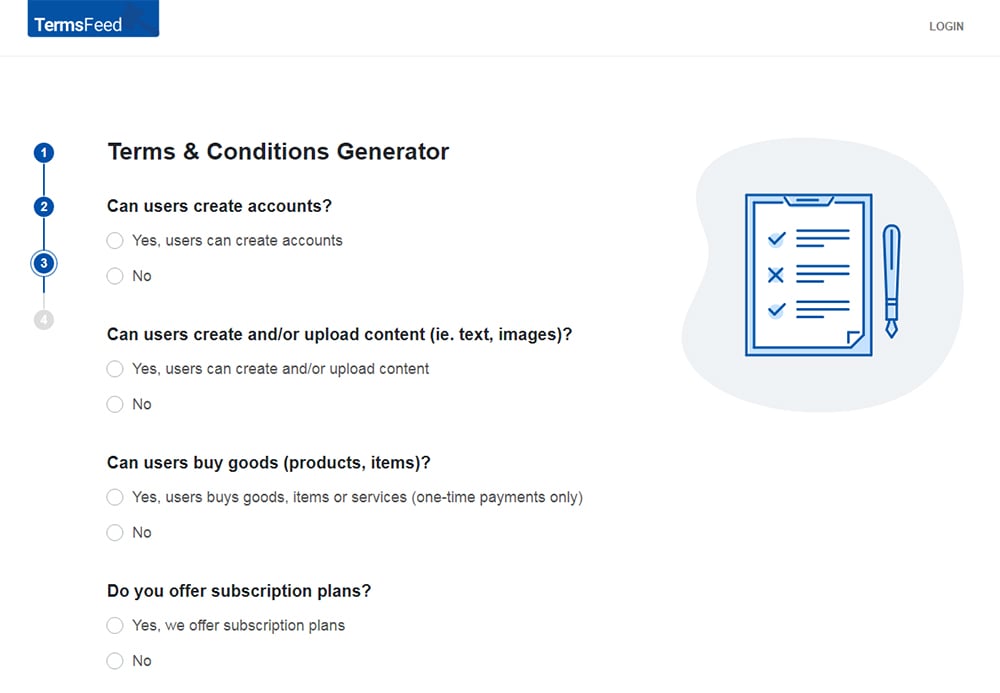
-
Enter the email address where you'd like the T&C delivered and click "Generate."
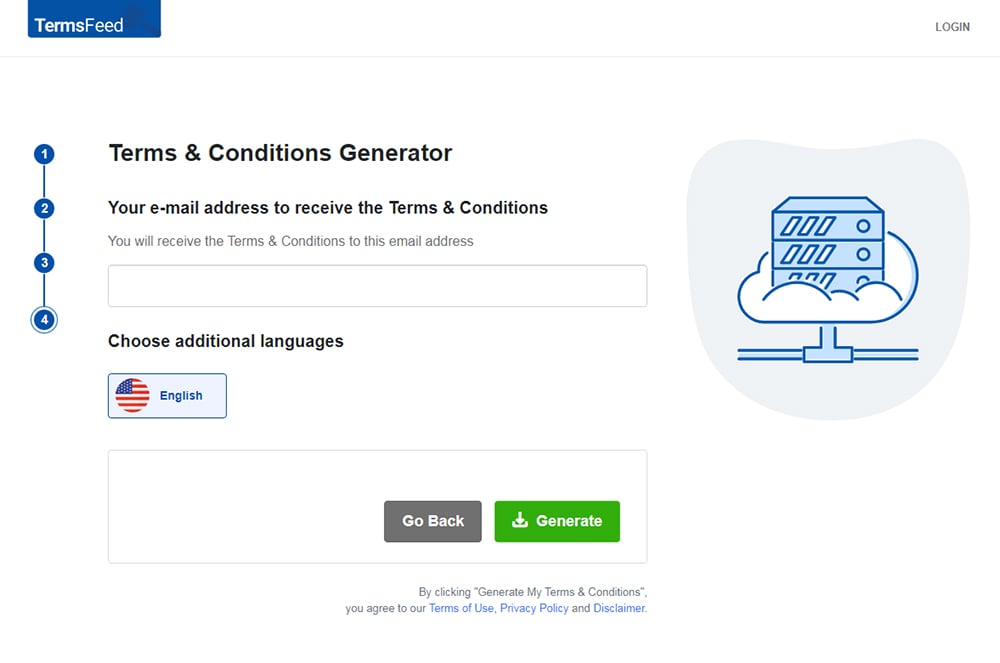
You'll be able to instantly access and download the Terms & Conditions agreement.
- 1. What is a Terms & Conditions Agreement?
- 1.1. Do You Need a Terms and Conditions Agreement?
- 2. Examples of Ridesharing App Terms and Conditions
- 2.1. Turo
- 2.2. Car2Go
- 2.3. Getaround
- 3. Clauses to Include in Your Ridesharing App's Terms and Conditions
- 3.1. Restricted Behavior
- 3.2. Acceptance of Terms
- 3.3. Membership Clause
- 3.4. Membership Access Clause
- 3.5. Suspension and Termination of Membership/Use Clause
- 3.6. User Content Clause
- 3.7. Driving Privileges Clause
- 3.8. Payments and Billing Clause
- 3.9. Reference to Privacy Policy
- 3.10. Intellectual Property Rights Clause
- 3.11. Governing Law Clause
- 3.12. Changes to Terms Clause
- 4. Conclusion
What is a Terms & Conditions Agreement?
A Terms and Conditions agreement (also referred to as a Terms of Use or Terms of Service agreement) sets out the relationship between your business and your customers to protect both of you and continue to grow the value in your relationship.
It's an agreement that outlines when, where, and how your business provides a service to your customers.
It also outlines what users must do to agree to do when using your app.
A basic Terms and Conditions often includes clauses that cover the following:
- Copyright Notice
- Privacy Policy references
- Warranties
- Limitation of Liability
- Third Party Connections
- Pricing Errors and Refunds
- Restrictions
- Website Use
- Intellectual Property
Ridesharing services will also use similar clauses, but they need to be tailored specifically to the type of business you run and how you run it.
Do You Need a Terms and Conditions Agreement?
There's no law that requires any business to have Terms and Conditions, but it is still essential.
This agreement is more than just good business practice. It helps to legally protect your business in a number of ways.
1. Protect Your Business from Abuse
The agreement outlining the rules to follow to engage with your business protects your business from abuse. In the rideshare setting, it protects customers from abusing cars, drivers, or refund policies. It also gives you leeway to decline to serve customers when they violate your Terms without worrying about them taking legal action.
You'll have the final say when it comes to your business - not the customer - so you'll be better able to grow your business the way you see fit.
2. Protect Your Intellectual Property
As a business owner, you might think you own your content, website, and logo -- and you do.
However, the internet is the modern wild, wild west, so it's also important to explicitly state ownership in your Terms and Conditions.
Your T&C is a good place to outline your copyrights and intellectual property.
3. Outline Your Corporate Culture
If you haven't been following along, corporate culture is important for ridesharing apps. Uber, in particular, has shown why you need to be sure of the beliefs and behaviors you want to instill in your team, your partners, and your customers to run a successful business.
Examples of Ridesharing App Terms and Conditions
A Terms and Conditions agreement is only as strong as it is personalized.
Your Terms and Conditions should reflect:
- Your company's culture
- The relationship you want with your customers
- The relationship you want with your partners
To put this into perspective, let's look at examples of existing ridesharing services:
Turo
Turo connects car owners with drivers across the United States. It offers users the chance to book whatever car they want rather than being subject to the whims of rental agencies. It's available in 4,500 cities across the United States and serves 300 airports. Customers are able to rent conventional cars like sedans as well as occasional luxury or specialty cars like Maseratis or Hummers.
Turo has a Terms of Service that was last updated on January 12, 2018. The T&C stands separately from its cancellation, privacy, and deposit policies.
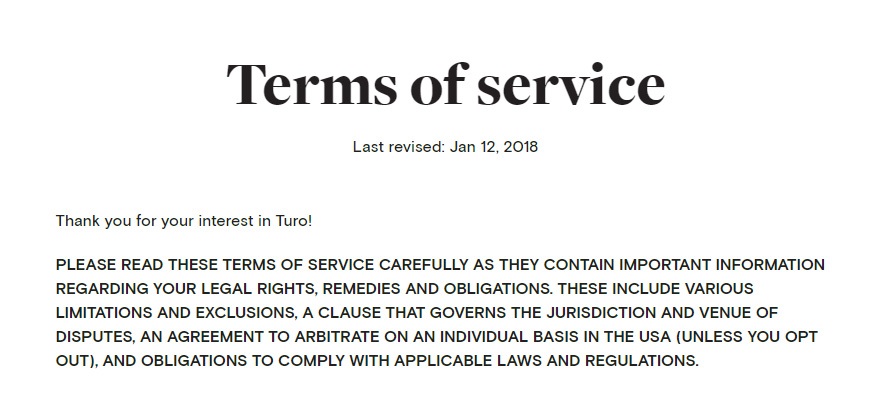
Turo's Terms agreement includes the following sections:
- General Terms (Eligibility, Registration, Verification, Violations, etc.)
- Legal Disputes for Owners and Travelers Residing Anywhere Other Than Canada
- Legal Disputes for Owners and Travelers Residing In Canada
- Other Legal Matters
- Specific Terms for Guests
- Specific Terms for Owners
The "Your Commitments" section within the General Terms stands out. It informs users that in using Turo's service, users are agreeing to provide safe, legal vehicles in good operation and guests agree to be legally licensed drivers who promise to car for the vehicle.

It also informs customers or "hosts" that they cannot use the car to violate any laws, submit false information, or fail to honor commitments like paying the fee, returning the car on time, rent cars for someone else under your name, or harm or threaten any member of the Turo community.
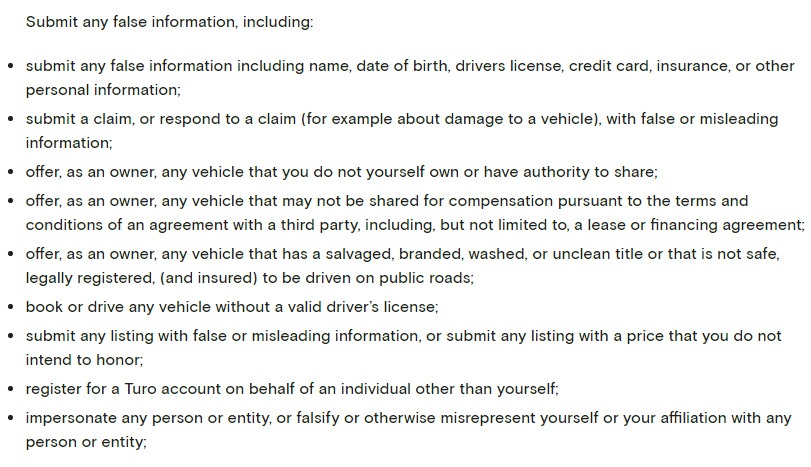
The Policy Enforcement section is also uniquely written for Truro:

The clause allows Truro to make decisions that make sense for partners and hosts rather than creating unmitigated bureaucracy. It recognizes that sometimes things happen, especially on the road, and some leniency is required.
Car2Go
Car2Go is a car rental service that allows users to pick up their car from a designated Car2Go lot in the city. It primarily functions as a subscription service for the impetuous who need a car but don't have time to deal with reservations, lines, or facility charges. There are no monthly or annual fees - you buy credit and go.
It offers several Terms of Use under the wider umbrella:
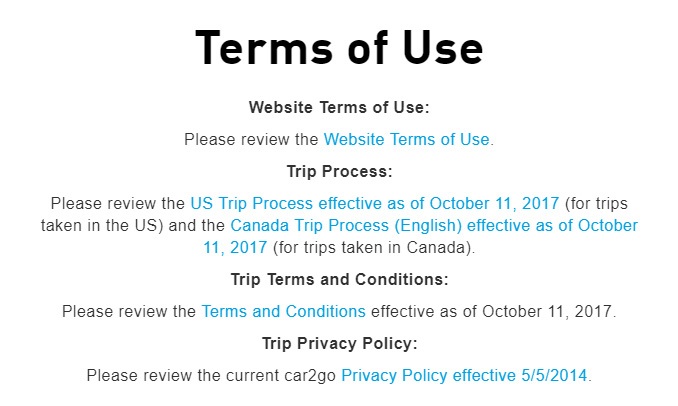
There's a general Terms of Use for the website as a trip Terms and Conditions and descriptions of the trip process.
Let's look at the Trip Terms and Conditions because they're unique compared to other rental services that don't require a membership for use.
The Terms agreement includes the following clauses:
- Applying for Car2Go Membership
- Car2Go Driving Privileges
- Membership Access
- Prices and Payments in Default
- Billing
- Suspension and Termination of Car2Go Membership
- Indemnification Obligation of the Member and Hold Harmless Requirement
- General Terms
- Explanations and Comprehension
The clauses double as an explanation for initiating involvement with Car2Go. For example, the Applying for a Car2Go clause explains who is able to register, how to register, and what's required during registration. It explains that it uses a third-party service to certify information provided.
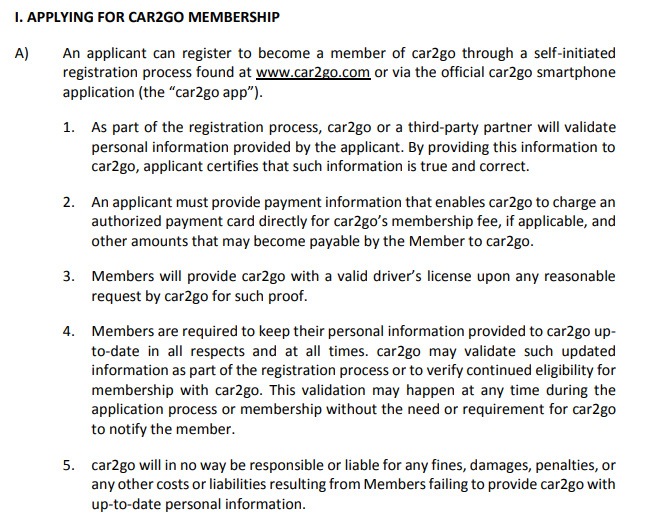
The Driving Privileges section informs customers that members without a full, valid license will see their privileges suspended even if their membership remains intact.
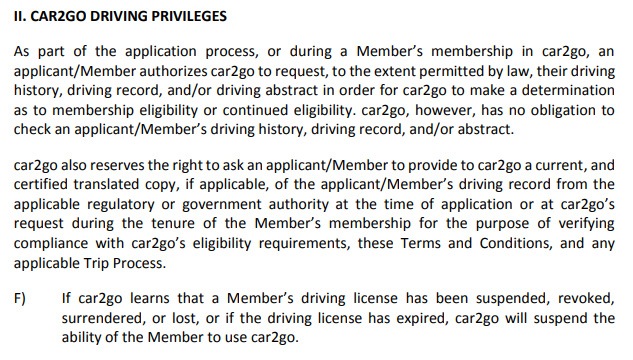
Car2Go also outlines exactly who can use the vehicle once a membership is obtained and credit has been purchased:
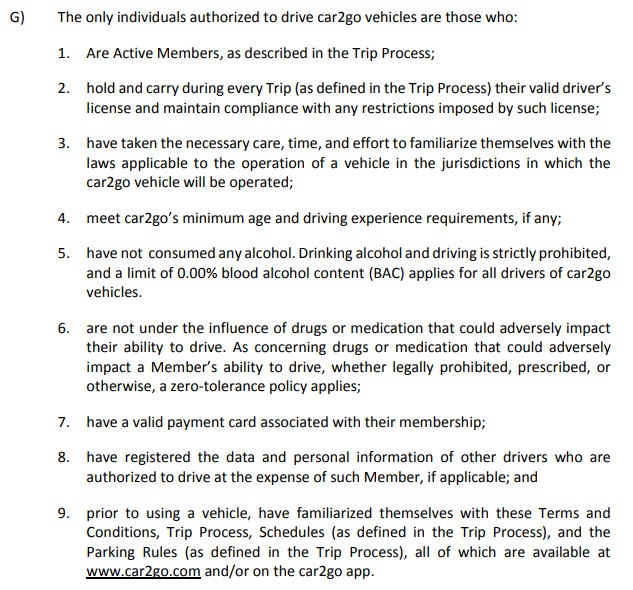
Some of these explanations seem obvious, but it is essential to outline them anyway for legal protection in addition to noting that Car2Go members cannot use their vehicles to violate any state or federal laws.
It adds both another layer of legal protection while also highlighting the company's commitment to encouraging the best experience possible for both members and in the service's relationship with the community.
Getaround
GetAround.com is a peer-to-peer vehicle rental site with no membership fees and instant membership verification. The site connects local car owners with drivers allowing owners to make a maximum of $10,000 per year in extra cash for cars that otherwise sit idle. All insurance and fees are included to create a safe space for private car owners to rent their vehicles.
Getaround's Terms of Service includes the following clauses:
- Use of Our Service (Eligibility, Accounts, Service Rules, Policies and Procedures)
- User Content
- Other Uses; No Endorsement
- User Content License Grant
- End User Licenses
- Our Proprietary Rights
- Fees; Billing; Payments
- Privacy
- Security
- SMS Owner ALerts
- DMCA Notice
- Additional Representations and Warranties
- Third-Party Links
- Indemnity
- Insurance
- No Warranty
- Limitations of Liability
- Assignment
- General (catch-all clauses like arbitration, governing law, disclosures)
Many of these are standard clauses found in any Terms and Conditions agreement, but there are a few that stand out as important for ridesharing services that feature not only account services but public accounts featuring reviews and communications.
The User Content clause tackles the issues of accounts and public profiles:
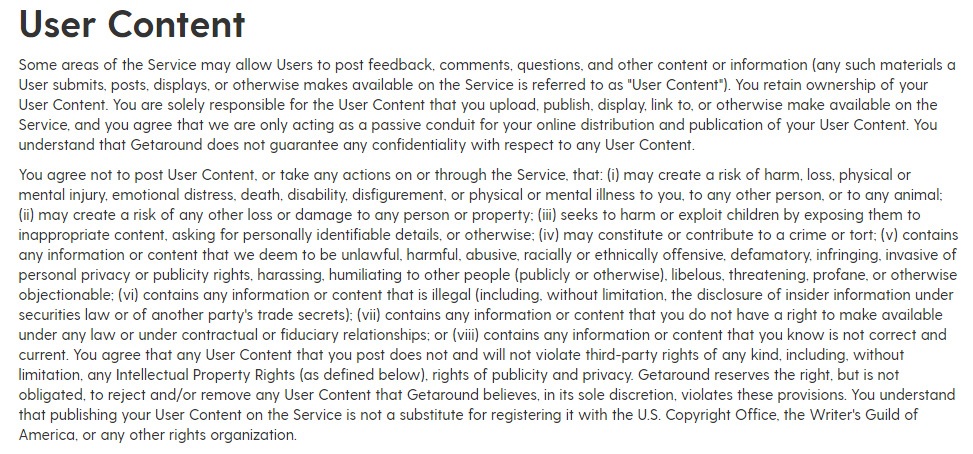
The clause states that the account holder owns all their content including their posts, feedback, question, and comments on the site. It also stipulates that users are not allowed to use their content rights to hurt others, exploit others, or commit any sort of crime. More importantly, it states that Getaround isn't responsible for the content sent, so even if objectionable content appears, Getaround isn't at fault.
The Other Users; No Endorsement clause is also unique and is worth considering adapting for your own purposes.
It states that Getaround validates a user's identity, but that certification isn't an endorsement of the user. Checking a license or a credit card only means the user has a valid license or payment method. It doesn't mean other users will have a positive interaction with that user. It works as a "use at your own risk" disclaimer of liability.
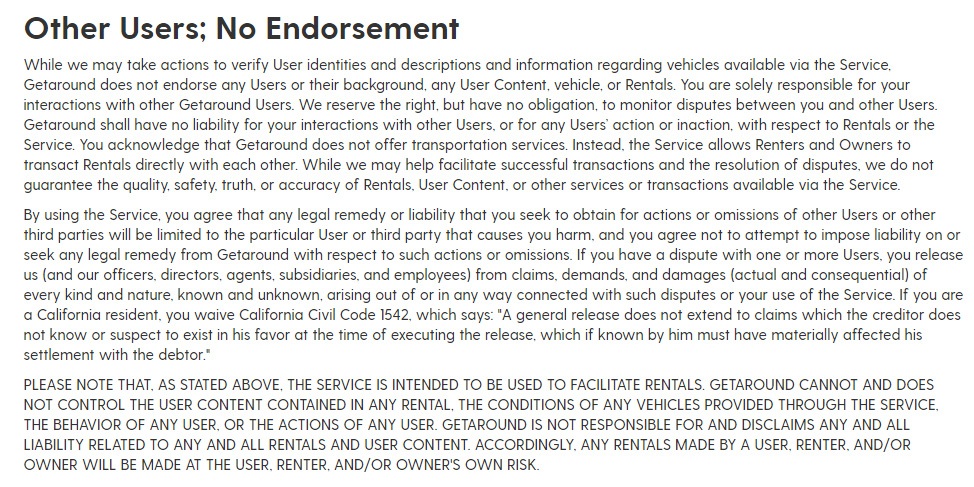
Clauses to Include in Your Ridesharing App's Terms and Conditions
The precise details of your T&C should always be written according to the service you provide and the state laws governing your operations. However, there are some clauses that should be included in most Terms and Conditions (where relevant).
Here are a few:
- Restricted or Prohibited Activities
- Acceptance of Terms
- Membership Clause
- Membership Access Clause
- Suspension and Termination of Membership/Use Clause
- User Content Clause
- Driving Privileges Clause
- Payments and Billing Clause
- Reference to Privacy Policy
- Intellectual Property Rights Clause
- Governing Law Clause
- Changes to Terms
Restricted Behavior
One of the most beneficial aspects of having a Terms and Conditions agreement is that you get the ability to clearly set forth what is not allowed. With a ridesharing platform, this is very important since there is so much at stake between vehicle values, driver interaction and road safety.
This clause can be a list of both general and specific things that your app users are not allowed to do.
Here's how Lyft does this in its Terms of Service:
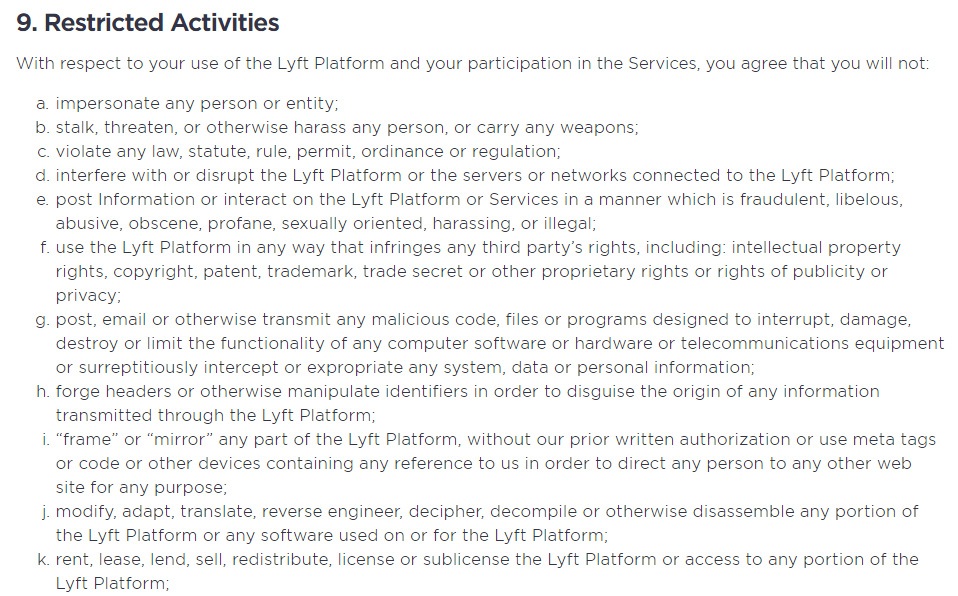
Acceptance of Terms
Your Terms & Conditions aren't valid until the user accepts them. If you want that acceptance to be enforceable, you can create a pop-up that users must tap (or click if on a website) to accept the Terms and Conditions. A checkbox or toggle button also works well.
Here's how Blacklane - a transportation and travel service that lets you get a car and driver - gets users to agree to its Terms at sign-up. Note that the Sign Up button is greyed out until the button is selected next to the statement about reading and agreeing to the terms:
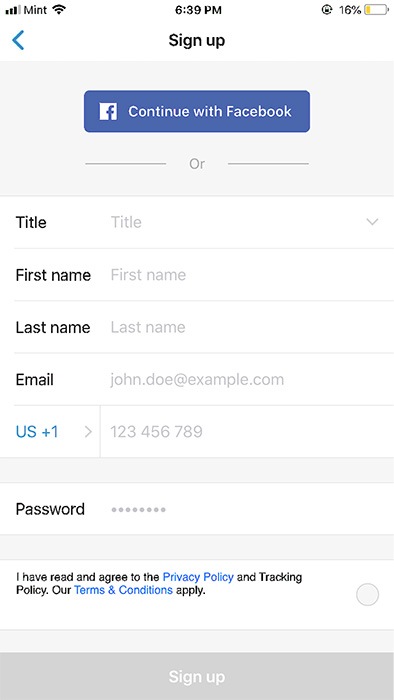
A user cannot sign up unless agreeing to the terms:
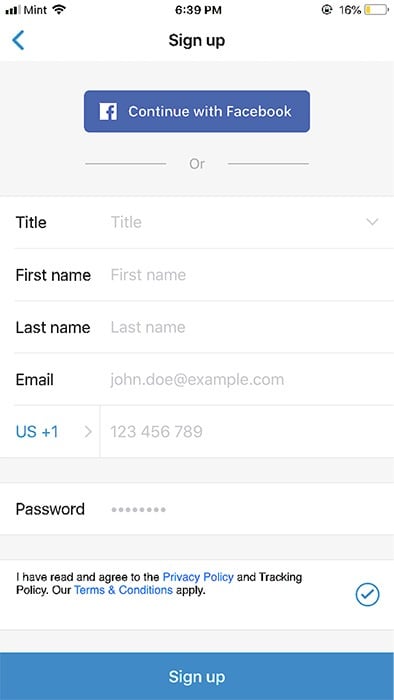
Membership Clause
A membership clause outlines the steps required to become a member and what membership to the site means. It states who can and cannot become a member as well as any other outside parties that participate. If you use a third-party verification system, then outline this here.
Membership Access Clause
A membership access clause for ridesharing apps outlines what a member can do with the product once granted membership.
It should outline general information about memberships and restrictions. They'll usually note things such as:
- When memberships become active
- Whether memberships are transferable
- How to secure a membership
- Violations of the membership
Here's an example from Car2Go's membership access clause:

Suspension and Termination of Membership/Use Clause
What does a user need to do to violate your terms, and when can that violation turn into a suspension or termination of membership? You'll use this clause to outline all of that.
Getaround's Terms of Service says that:

Lyft also includes a Term and Termination clause in its Terms of Service:
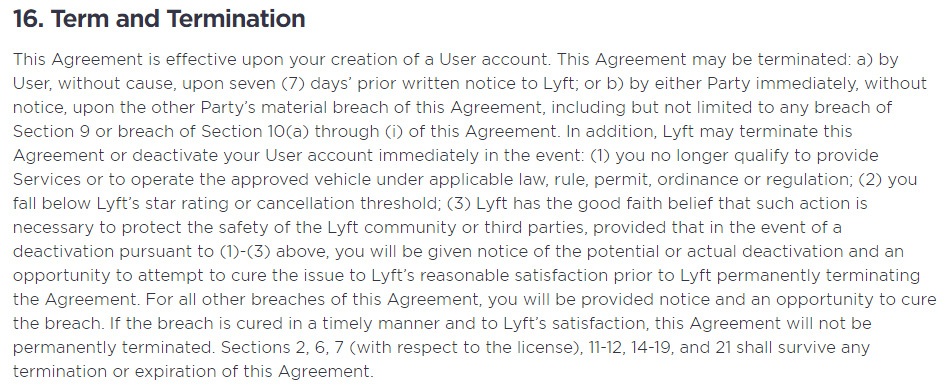
User Content Clause
If you're using public profiles and user-generated content, you should add a user content clause.
The clause should cover the following points:
- Who retains ownership of the content
- Guidelines for posting content
- Copyright issues
Even if you don't routinely allow user generated content, it's a worthwhile clause to add.
Here's a snippet from Uber's User-Provided Content clause:
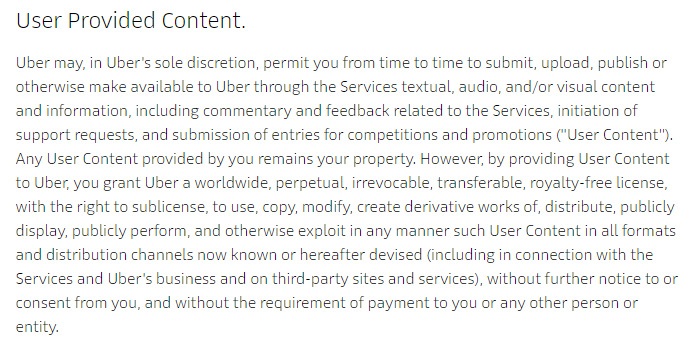
Driving Privileges Clause
A driving privileges clause allows your business to request the driving history of a user to the extent permitted by governing law. It also allows you to request a record if so desired.
The clause is important for data privacy, but it also provides you with a threshold for declining service.
For example, Car2Go uses its privileges clause to deny services:

Additionally, as noted in the Car2Go example, the clause lays out exactly who can drive their cars - membership or not.
Car2Go says the only people who can use their cars are those who:
- Are active members
- Use their own drivers license
- Know how to drive in the locale they're driving in
- Are sober
- Have a valid method of payment
- Have read the Terms and Conditions for all Car2Go services
Payments and Billing Clause
Payments and billing can be compiled into one clause or separated into two distinct clauses. It's worth separating the two if you charge membership or any kind of access fees beyond what's required.
Car2Go has both a Prices and Payments clause as well as a Billing clause.
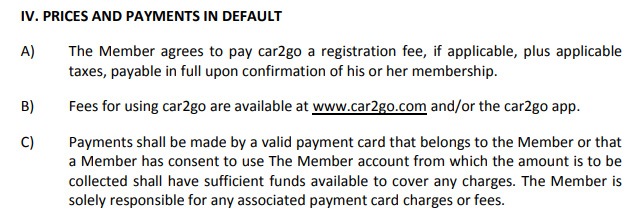
The Billing clause is where Car2Go makes it clear that the company isn't financially responsible for things like traffic violations, parking violations or toll costs.
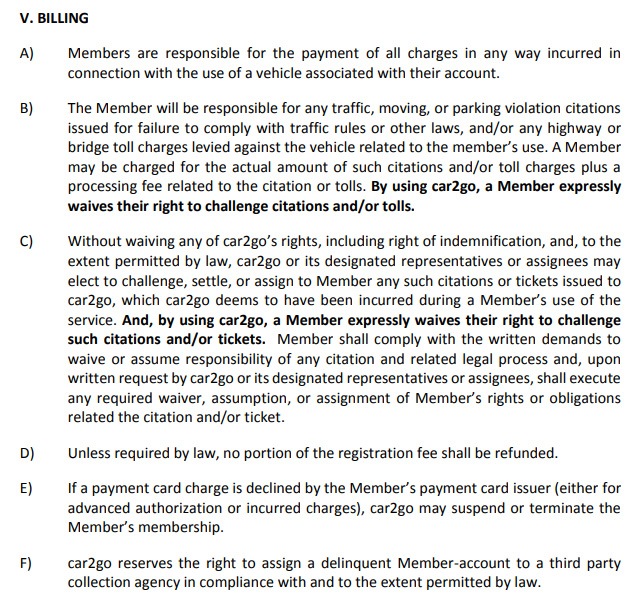
Reference to Privacy Policy
You should reference and link to your Privacy Policy from within your Terms and Conditions.

Intellectual Property Rights Clause
Using a unique idea to make your rideshare app really stand out? Include a clause in your Terms and Conditions that protects your content, including graphics, trademarks, and website.
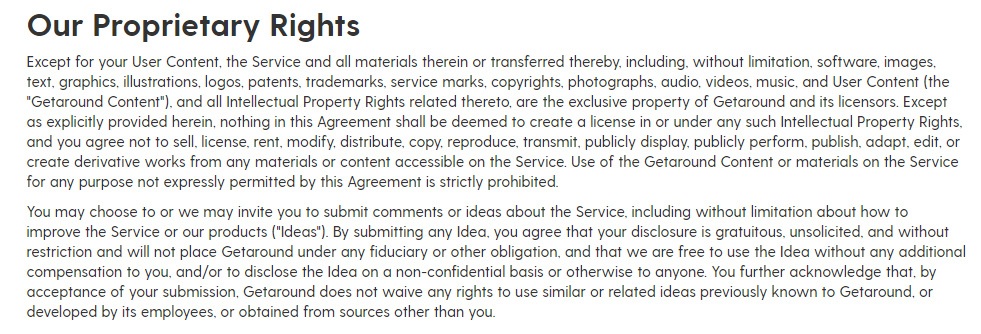
Governing Law Clause
Governing law clauses state the laws that apply to the company. Your choice of governing law can be applied to any jurisdiction. Read this post for more detailed information on this type of clause.
You can also include arbitration requirements in this clause or a separate arbitration clause. For example, Uber uses the American Arbitration Association rather than any federal, state, or local court agency.
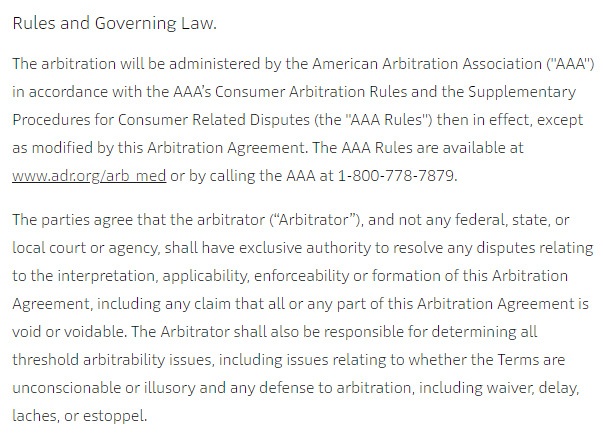
Changes to Terms Clause
The changes to terms clause states the business is allowed to change and update the Terms at any point. This gives you the freedom to change your terms and puts users on notice that this may happen. Let users know how you plan to notify them of updates or changes.
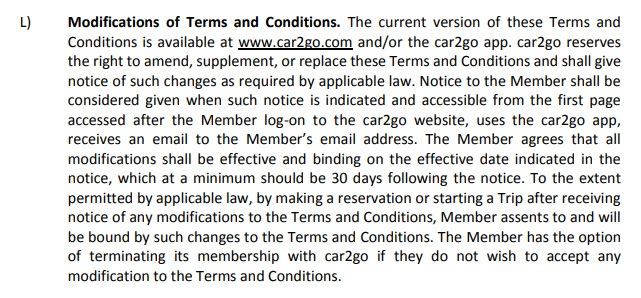
Conclusion
If you want to avoid the publicity nightmare companies like Uber have endured and protect the value of your business, then you need a solid Terms and Conditions agreement that's written with the service you provide in mind.
The examples listed above provide an insight into how to write additional clauses that apply specifically to ridesharing apps, but don't forget to add all the general and standard clauses found elsewhere as well.
Remember, your Terms should reflect your rules and your company culture to create the kind of relationships you want to have with your customers, partners, and communities.

Comprehensive compliance starts with a Privacy Policy.
Comply with the law with our agreements, policies, and consent banners. Everything is included.
